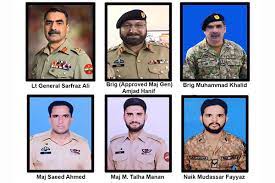The three-member bench of the Election Commission of Pakistan (ECP) has finally released its decision in the PTI’s prohibited funding case, also known as the foreign funding case, after a nearly eight-year-long wait.
explicitly prohibited
The Imran Khan-led PTI did receive funding from foreign firms and individuals, which it hid, according to the commission’s 68-page order. For the time being, the ECP has given the party a show-cause notice asking it to provide justification for not seizing the illegal funds.prohibited

It is necessary for the government to submit a declaration to the court.
After the Election Commission’s order, which very clearly stated that the PTI has been receiving foreign funds, the federal government is left with few options. It would be challenging for the government to refrain from declaring that the party [PTI] is currently receiving foreign assistance. The Supreme Court will then review the declaration after that.prohibited
The legal definition of “foreign aided” is very specific and covers funding from international sources. Whether or not this is fair is up for debate. But at the moment, that is the law.
prohibited
— Ahmed Bilal Mehboob, head of Pakistan Institute of Legislative Development and Transparency
“Court, not ECP, shall decide”
The ECP has limited the scope of its decision to the confiscation of funds under Article 6 of the PPO and Rule 6(3) of the PPR; it has not held that the PTI is ineligible for funding under the definition of a “foreign-aided party,” which means it received such funds from a foreign government or political party.

The Supreme Court previously ruled in Hanif Abbasi v. Imran Khan that there is no difference between operating as a foreign-aided political party and receiving prohibited funds; however, this ruling only applies to confiscation and is still up for further review.
Regarding Khan, the Supreme Court established in recent jurisprudence that it is the intention of the legislator that is taken into account, and not just the fact of omission, before warranting a declaration of dishonesty or otherwise — that is another question that has not yet been resolved.
In any case, the ECP cannot make such a declaration; only a court of law may.

PTI cannot be in two places at once.
Was it illegal for the PTI to receive funds from foreign sources, as the ECP was asked to determine? The PTI has made a lot of distinctions between instances of “foreign funding” and “prohibited funds.”
It was not the case that PTI received funding from a foreign government or political party. But regardless of how you want to describe it, the ECP has now discovered that the PTI received funding from foreign individuals and businesses.
These funds are also illegal according to the law. The ECP also discovered that Khan submitted “grossly inaccurate” forms in this area while serving as chairman.
prohibited
While Article 62(1)(f) has historically been used for less, it would be better for us to restrict its application rather than give it more authority. Legally speaking, the possibility of confiscating the funds exists.
However, this has broader implications morally. The PTI has a history of elevating itself above other political parties and portraying itself as pure.
Even now, in the wake of the ECP’s conclusions, it continues to use inquiries into other parties as a crutch. Similar to that, those issues ought to be resolved as soon as possible. But they don’t affect the findings against the PTI. PTI can’t have it both ways.
‘Dangerous phase’ survived
The order establishing that the case relates to prohibited funding means that the PTI has survived the “dangerous phase” because it is not a case of foreign funding.
The problematic part is the false affidavit that party chairman Khan filed, claiming that, in light of the Hanif Abbasi ruling, 62(1)(f) — sadiq o ameen — proceedings can be started against him.
According to the three-member bench’s ruling, the court now has a clear view, which is necessary for 62(1)(f) proceedings.

There’s a catch, though. Various court orders have been issued, and there is disagreement among the courts as to whether the ECP is a court or not.
To begin proceedings under Section 62(1), the Supreme Court must have certain undisputed facts in order to disqualify someone (f).
The PTI has for the time being held on, and it will now challenge the verdict in court, changing the political landscape.
The decision of ECP may have “serious consequences.”
The verdict might have negative effects on the PTI. Until the legal issues are resolved, neither the government nor the opposition can be stabilised.
Now is the right time for the nation’s political establishment to enact legal changes.
The “rule of law”
The law ought to be the same for everyone in the nation and there ought to be a rule of law. Despite not receiving a salary from his son’s company, Nawaz Sharif was disqualified, while PTI has accepted funding from foreigners.
If the PTI does not comply with the ECP, its funds, which were obtained illegally, may be seized.



